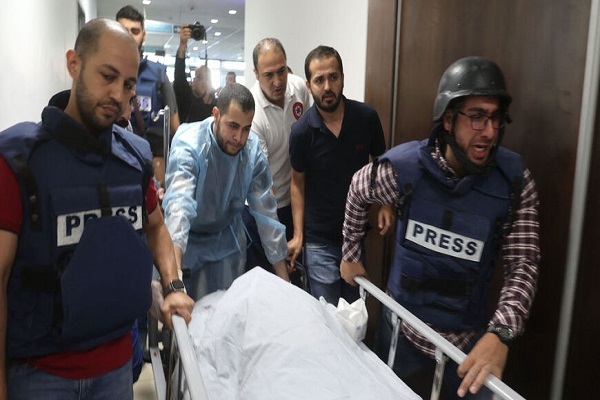Israel Waging War on Palestinian Media Workers, UN Investigators Told


"Israel is targeting Palestinian journalists as part of a systemic policy to stifle the Palestinian voices and to silence us," said Naser Abubaker, president of the Palestinian Journalists' Syndicate on Thursday. "We as Palestinian journalists are subjected to not just abuse and violations, but a wide-scale war by the occupying state."
Abubaker told a team of UN investigators that almost 50 Palestinian journalists have been killed doing their work since 2000 and "no one was held accountable".
The president of the Palestinian Journalists' Syndicate pointed to the murder case of Shirin Abu Akleh, a well-known Palestinian-American journalist for the Qatar-based and Arabic-language Al Jazeera television news network.
Abu Akleh was wearing a bulletproof vest marked "Press" and a helmet, when she was shot in the head by Israeli forces on May 11 while covering an Israeli forces raid on the Jenin refugee camp in the northern part of the Israeli-occupied West Bank.
Her tragic death sent shock waves across the region, drawing global condemnation. The United Nations and the European Union, among others, called for a full investigation into what has been described as a deliberate murder “in cold blood.”
He noted that Palestinian journalists had been subjected to 7,500 violations since 2013, around 830 a year, asking, "Would the world be silent if all of these crimes had occurred in any place other than Palestine?"
Abubaker referred to the case of Abu Akleh as an "extrajudicial killing" and a "war crime", noting that "so far, six months have passed without any accountability."
Abu Akleh's family has appealed for an independent investigation, including petitioning the International Criminal Court to open a probe into the killing.
The Israeli regime eventually admitted to the killing in September, claiming one of its military forces had likely shot Abu Akleh mistakenly.
The acknowledgment came after months of denial in which the Israeli regime had insisted Abu Akleh could have been shot dead by militants.
However, a United Nations investigation concluded in June that there were no militants in the vicinity of the refugee camp where she was shot dead by the Israeli forces.
Abu Akleh's killing is the subject of one of the first in a series of rare public hearings hosted by the United Nations Independent International Commission of Inquiry (COI), which was created by the UN Human Rights Council last year after an 11-day Israeli war on Gazans, to probe the roots of the decades-long plight of the Palestinians.
The first series of hearings, which are being live-streamed, kicked off on Monday with a focus on the Israeli regime's designation last year of seven Palestinian civil society groups as "terrorist" outfits.
Navanethem Pillay, the lead investigator on the UN commission, told the assembly that the aim of the hearings was "to allow victims and survivors on all sides to speak for themselves."
Pillay pointed out that the UN commission had "invited submissions from all parties and from states" and was "ready to hear alternate voices".
The Israeli regime has refused to cooperate with the UN commission investigating the crimes.
Furthermore, the US State Department announced in July that the US Security Coordinator (USSC) investigating the killing of Abu Akleh had concluded that she was likely killed by “unintentional” gunfire from Israeli positions, but said the independent investigators could not make a "definitive conclusion" on the origin of the bullet that struck her.
A senior member of the Palestine Liberation Organization (PLO) slammed the United States for defending the Israeli regime, insisting that the Tel Aviv regime should be held accountable for the killing.
Wasel Abu Yousef, the PLO's Executive Committee member, said in July that the truth of the matter is clear but the United States continues to stall.
Alongside Palestinian officials, human rights advocates, including Israel's leading human rights group B'Tselem denounced the US probe as a “US-backed Israeli whitewash”.
“All investigations published so far conclude that Israel is responsible for the killing of journalist Shireen Abu Akleh,” the group said in a tweet.
In the meantime, the Office of the UN High Commissioner for Human Rights (OHCHR) has already confirmed that Abu Akleh was killed by bullets that were fired from a rifle of an Israeli soldier.
'In cold blood'
Colleagues and family members of Abu Akleh told UN investigators on Thursday she had been deliberately targeted as part of Israel's "wide-scale war" on Palestinian media workers.
Abu Akleh's colleague Ali Sammoudi, an Al Jazeera producer who was also shot that day but survived, agreed.
He said the group was "wearing full journalist attire" and that there had been no militant activity nearby.
Suddenly "a bullet exploded in the air," he said, describing how he screamed "Go back!" before feeling "an explosion in my back."
He insisted that it was clear that "Shireen Abu Akleh was killed in cold blood, intentionally."
Speaking to the investigators, Lina Abu Akleh said it was "painful beyond words" to think about how her aunt died, insisting there was no doubt Israeli soldiers "were deliberately targeting my aunt."
"They didn't fully admit that it was them. They didn't even give us the name of the soldier," she told AFP. "They are unwilling to even open a criminal investigation."
She said no one from the Israeli regime has contacted the deceased victim's family since her aunt's funeral, which saw baton-wielding Israeli regime forces beat pallbearers carrying the coffin which was covered by a Palestinian flag.
"We want complete accountability. We want justice," the slain journalist's niece told AFP after testifying at what she described as a "historic" hearing at the UN headquarters in Geneva.
Ensuring accountability is vital to help prevent further bloodshed, she said, insisting that Abu Akleh's "killing is not a separate incident, but the part and parcel of the entire system that continues to perpetuate this type of violence."
Source: Press TV



